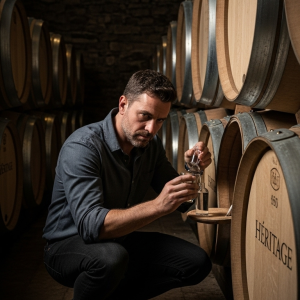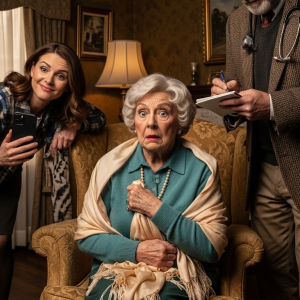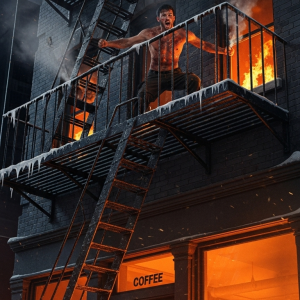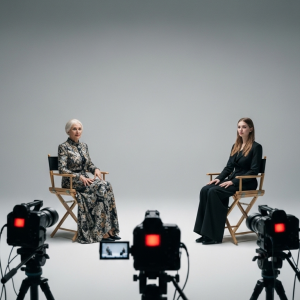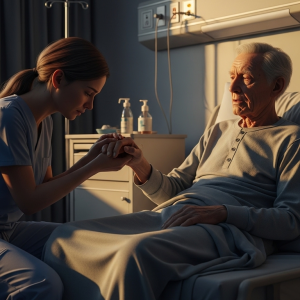Clara felt the soft California sun on her shoulders, a gentle warmth that promised new beginnings. The garden, fragrant with blooming jasmine and roses, felt like a world away from the cold, sterile rooms that had defined her past. This was her second chance, a real one, with a man whose kindness was as steady and reliable as the sunlight itself. David, her David, stood beside her, his hand a comforting weight in hers.
His smile was her sanctuary. Yet, even in this perfect moment, a shadow loomed. It had a name: Margaret, David’s mother. From the moment they’d met, Margaret had worn a smile as bright and brittle as glass, her eyes performing a constant, cutting appraisal. Clara was, in Margaret’s carefully chosen words, a woman with “history,” a puzzle she seemed intent on solving, not to understand, but to judge.
The signs had been there, small tremors before the earthquake. A few weeks ago, Margaret had casually mentioned speaking with Clara’s ex-sister-in-law. “I just wanted to get a clearer picture of your background, dear,” she’d said, her tone syrupy sweet. “To understand what my son is getting himself into.” Clara had felt a chill crawl up her spine, a familiar dread she had long tried to bury.
Then there was the matter of the dress. Her first wedding dress. A symbol of youthful hope that had curdled into a relic of pain and fear. It was supposed to be in a sealed box in her parents’ storage unit, but it had vanished a few months ago. A simple misplacement, her mother had assumed. Clara, however, felt a gnawing unease, a sense that a ghost from her past was being deliberately resurrected.
The ceremony was perfect. The vows they exchanged were not the flowery promises of naive teenagers, but the grounded, heartfelt commitments of two people who understood the value of peace and the work required for true partnership. When David slid the simple gold band onto her finger, Clara felt the last of the shadows recede. She was safe. She was loved.
The reception was held in a beautifully restored barn, strung with fairy lights that cast a magical glow over the laughing guests. The air was filled with music, the scent of wine, and the palpable joy of the celebration. David twirled her around the dance floor, his eyes full of a love so pure it almost made her forget the darkness she had once known. It was in that moment of perfect happiness that the world tilted on its axis.
The grand barn doors swung open, and a figure stood silhouetted against the fading daylight. A woman in a long, white, lace gown. A bride. As she stepped into the light, a wave of shocked whispers rippled through the crowd. It was Margaret. She was wearing a wedding dress, a magnificent, cruel statement of defiance.
But it was worse than that. So much worse. As Margaret glided into the room, a triumphant smirk on her face, Clara felt the air leave her lungs. The blood in her veins turned to ice. She knew that lace pattern. She knew the delicate pearl buttons that ran down the spine. It wasn’t just a wedding dress. It was her wedding dress. The one she had worn as she walked toward a man who would later shatter her world.
Margaret approached their table, her movements fluid and regal, every eye in the room following her. She leaned in close to Clara, the scent of her expensive perfume cloying and suffocating. Her voice was a venomous whisper, meant only for Clara to hear. “I just wanted to show you what a real bride looks like, dear,” she purred, her eyes glinting with malice. “Untouched by the past. Pure.”
The shock was a physical blow, a punch to the gut that left Clara breathless. For a heart-stopping second, she was back in that old house, the air thick with unspoken threats, her every move scrutinized and criticized. The barn, the music, the joyful faces—it all faded into a dull, distant roar. All she could see was that dress, a shroud she thought she had escaped forever.
But then, something shifted. The panic that clawed at her throat receded, replaced by a strange and terrible calm. This was not the terror of a victim. It was the cold, focused clarity of a survivor. She had faced down a monster before, and she had survived. Margaret, in all her theatrical cruelty, was nothing more than a bully playing with weapons she didn’t truly understand.
She looked at her new husband. David was frozen, his face a mask of confusion and embarrassment. “Mom… what are you wearing?” he stammered, his voice barely a whisper. Margaret simply waved a dismissive hand. “Oh, darling, don’t be silly. It’s just a white dress. A mother should be allowed to celebrate her son’s happiness, shouldn’t she?” He was caught, a deer in the headlights, trapped between the woman who raised him and the woman he loved. And in his hesitation, Clara knew. He didn’t understand. Not yet.
This was her battle to fight. The whispers from the guests grew louder, a chorus of confusion and secondhand embarrassment. Clara watched Margaret preen, soaking in the attention, believing she had won. Believing she had successfully branded Clara as used, as tainted, right in the heart of her new beginning. It was in that moment, watching the smug satisfaction on her mother-in-law’s face, that Clara made a decision. She would not be silent. Not anymore. The time for toasts and speeches was approaching. And she knew exactly what she was going to say.
A few minutes later, the DJ announced it was time for the bride and groom to say a few words. David, still looking pale and uncertain, reached for her hand, but Clara gently pulled away. She walked to the small stage alone, each step deliberate and sure. The room fell quiet, a tense anticipation hanging in the air. She picked up the microphone, her hand steady.
She scanned the room, her eyes pausing on friends and family who had supported her, before finally landing on David, a look that conveyed both love and a silent plea for him to trust her. Then, she turned her gaze directly to Margaret, who was seated at the head table like a queen holding court. Margaret offered a small, condescending smile, expecting a tearful, humiliated retreat. She was about to be sorely disappointed.
“I want to thank you all so much for being here to celebrate with us,” Clara began, her voice clear and strong, resonating through the silent barn. “Your presence here means the world to both David and me. It marks the start of a new life, a life built on honesty, trust, and courage.”
She paused, letting the words hang in the air. “And on that note,” she continued, her voice taking on a sharper, more precise edge, “I want to give a very, very special thank you to my new mother-in-law, Margaret.” All eyes swung to the woman in white. Margaret’s smile widened, a flicker of triumph in her eyes.
Clara locked her gaze with Margaret’s. “Thank you for going to such incredible lengths to make today memorable. And thank you… for wearing my old wedding dress.” A collective gasp sucked the air from the room. You could have heard a pin drop on the wooden floor. Margaret’s face went slack, the color draining from her cheeks. The smugness was replaced by a flash of pure, unadulterated panic.
But Clara wasn’t finished. She leaned closer to the microphone, her voice dropping to a confidential, yet carrying, tone. “It takes a lot of courage to wear a gown with so many… memories attached. Memories of screams that no one in the neighborhood heard, and bruises that had to be hidden under all that beautiful lace.” She held Margaret’s horrified gaze. “I truly hope it brings you more happiness than it ever brought me.”
The silence that followed was absolute, profound, and devastating. It was the sound of a carefully constructed reality shattering into a million pieces. Margaret sat completely still, her face a canvas of disbelief and horror. The white dress, which seconds before had been her armor of superiority, now looked like a funeral shroud. She had intended to humiliate Clara with a symbol of a failed marriage; instead, Clara had revealed it as a relic of unspeakable suffering, turning Margaret’s cruel stunt into a monstrous act of emotional desecration.
The whispers started again, but this time they were not of confusion. They were of shock, of pity for Clara, and of disgust for Margaret. The public shaming Margaret had engineered had been turned back on her with surgical precision. She was no longer the queen of the party; she was a villain exposed, her cruelty laid bare for all to see.
Suddenly, David moved. The fog of confusion had vanished from his eyes, replaced by a dawning, sickening understanding. The “talks” with the ex-sister-in-law. The missing dress. Clara’s occasional flinching from loud noises or sudden movements. It all coalesced into a single, horrifying truth. The depth of his mother’s malice, and the true extent of his wife’s hidden pain, hit him with the force of a physical blow.
He strode onto the stage, not to his mother’s side, but to Clara’s. He didn’t try to explain or apologize for his mother. He stood next to his wife, a silent, unshakeable wall of support. He took the microphone from her trembling hand, his own voice thick with a mixture of rage and profound regret. He didn’t look at the crowd. He looked only at his mother. “Mom,” he said, his voice quiet but carrying an undeniable finality, “I think it’s time for you to leave.”
There was no argument. Margaret, utterly defeated, stood up on shaky legs. The eyes of every guest followed her as she walked the long, silent path to the barn doors and disappeared into the night, a ghost banished from the feast. The spell was broken. The party was effectively over, but the marriage had just truly begun.
Later that night, in the quiet of their hotel suite, the dam finally broke. David held Clara as she wept, not with the fresh pain of that evening’s humiliation, but with the release of old, buried grief. And for the first time, she told him everything. Not the sanitized version, but the whole, ugly truth of her first marriage—the control, the fear, the way her spirit had been systematically eroded.
David listened, his heart breaking with every word, his shame at his own blindness a palpable thing. “I’m so sorry, Clara,” he whispered, his voice cracking. “I’m so sorry I didn’t see. I never should have let her… I will never let anyone hurt you again. Ever.” He wasn’t just making a promise; he was taking a vow far more powerful than the one he had made at the altar that morning.
Margaret’s cruel, calculated act of war, designed to poison their union at its very root, had failed spectacularly. It had not driven a wedge between them. Instead, it had forced a painful, necessary truth into the light, incinerating all secrets and illusions. Their wedding day wasn’t the perfect fairy tale they had hoped for. It was something far more real, and far more powerful. It began with a brutal act of cruelty, but it ended with a foundation of unbreakable trust, forged in the fire of a shared battle and cemented by a fierce, protective love that would now define their future.
The tears eventually subsided, leaving behind a profound stillness in the dimly lit hotel suite. The opulent room, chosen for a night of celebration, now felt like a quiet hospital wing, a place for recovery after a traumatic surgery. Clara felt hollowed out, but not empty. It was the clean, echoing quiet after a storm has passed, leaving the air washed and new. For the first time in years, she had let all the poison out, and she had not been abandoned.
David held her, his touch no longer just loving, but fiercely protective. He was processing the ugly details she had shared, and she could feel the coiled anger in his muscles—an anger directed not at her, but at a world that had allowed her to be hurt. “The dress,” he said, his voice a low growl. “She didn’t just find it in a thrift store. She must have planned it. Contacted your ex-family, gotten it from them… the cruelty is… I don’t have a word for it.”
“It was a weapon,” Clara whispered, her voice hoarse. “She saw my past as a stain, and she wanted everyone else to see it, too. She wanted you to see it and be ashamed.” She looked up at him, her eyes searching his. “Are you?” The question was a ghost of her deepest fear, a fear that had haunted her from the moment she accepted his proposal.
David pulled back just enough to look her directly in the eyes, his expression one of absolute certainty. “Ashamed? Clara, I have never been prouder of you than I was tonight. Watching you stand up there, you weren’t just speaking to my mother. You were facing down every ghost she tried to throw at you. You didn’t just save our wedding. You saved yourself, right in front of my eyes.” He traced the line of her jaw with his thumb. “My only shame is that it took me this long to see the battles you’ve already won.”
There was no grand passion that night. Instead, there was a different, deeper form of intimacy. He helped her out of her own wedding gown—the gown of her present, her future—and they washed the tearstains from her face together. As they lay in the vast, empty bed, there was a universe of unspoken understanding between them. His arm was a barrier around her, a silent promise that she would never have to fight alone again. For the first time in a decade, Clara slept without fear.
The morning light crept into the room, soft and forgiving. Clara woke first, turning to watch David sleep. The stress of the previous night was etched on his face, but he seemed younger, stripped of a certain naivete he had always carried. He had seen the monster in his own family and had chosen his side without hesitation. He had become the man she always knew he could be.
His phone buzzed on the nightstand, a harsh intrusion into their fragile peace. He stirred, his eyes fluttering open. He looked at her, and a slow, tired smile touched his lips. “Hi, wife,” he murmured, the word feeling both new and ancient.
“Hi, husband,” she replied, her own smile feeling real and unforced.
The phone buzzed again, insistently. With a sigh, David reached for it. His expression immediately hardened, the brief moment of peace shattered. Without a word, he handed the phone to Clara. It was a series of texts from Margaret.
Text 1: “David, I am worried sick. You didn’t come home. Are you alright?” Text 2: “She has poisoned you against me. I was only trying to show you the truth about the kind of woman she is. Some things can’t be washed clean.” Text 3: “Call me. Your family is supposed to come first. We need to fix this.”
There was no apology. No remorse. Only manipulation and a twisted sense of victimhood. Clara handed the phone back, a cold resolve settling in her heart. She felt nothing. No anger, no pain. Just a final, quiet closing of a door that should never have been opened.
David read the texts again, his thumb hovering over the screen. Then, with a decisive click, he blocked the number. He then did the same on his social media accounts. The action was swift, clinical, and final. He looked at Clara. “My family is first,” he said, his voice firm. “You are my family. That life, that… toxicity, is over.”
He stood up and walked to the closet, pulling out their packed bags. “I know we were supposed to stay here for two more days, go to the brunch, open gifts… but I can’t. This isn’t us.” He turned to her, a new light in his eyes, an idea taking shape. “Let’s leave. Right now. We can drive down the coast. Find a small town, eat at a diner, walk on a beach. Our honeymoon doesn’t start with catered breakfasts and polite conversations about… last night. It starts now. Just us.”
A wave of relief so powerful it almost made her dizzy washed over Clara. He was right. This grand hotel, this planned itinerary, it was all part of a wedding that had died the moment Margaret walked through those doors. They deserved a new beginning.
They didn’t bother with the formal checkout. They left the keycards on the table, walked out of the suite, and didn’t look back. An hour later, they were in a small, sun-drenched diner a hundred miles down the coast. The air smelled of salt and coffee. There were no fairy lights, no string quartet, no judgmental eyes. It was beautifully, blessedly normal.
David reached across the worn Formica tabletop and took her hands. “This is our wedding breakfast,” he said with a grin. “And that awful night? That wasn’t our wedding. That was the funeral for the past.”
Clara looked at their joined hands, then up at his face, illuminated by the morning sun streaming through the window. He was right. Their marriage wasn’t born in a garden under a perfect sky. It was forged in a fire, tested and proven true in a matter of hours. The scars from her past were real, but for the first time, they weren’t just hers to carry. They were part of a new story, a story of a man who loved her not in spite of her history, but because of the strength it had taken to survive it. And in the quiet clatter of a small-town diner, their real life began.
